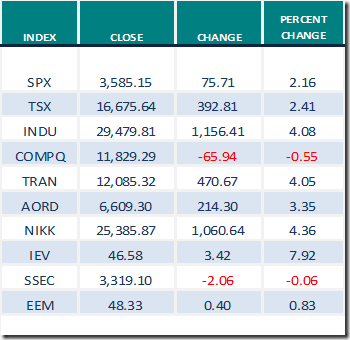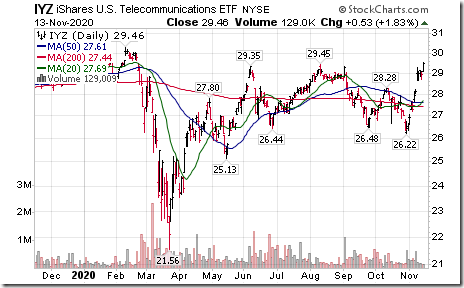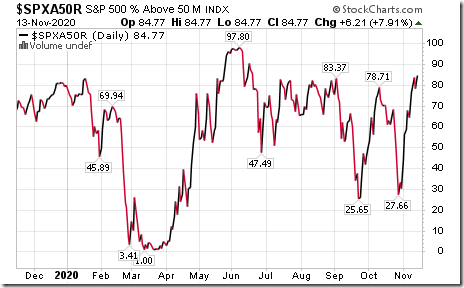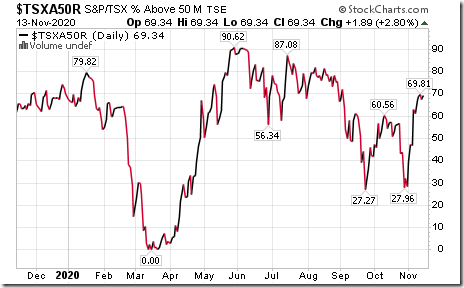by Don Vialoux, EquityClock.com
The Bottom Line
Most major equity indices around the world moved higher again last week. Greatest influences remain growing evidence of a second wave of the coronavirus (negative) and possible approval of a vaccine (positive)
Observations
The Dow Jones Industrial Average and S&P 500 Index are following their historic trend after a U.S. Presidential Election. Indeed, the strongest 12 week period during the four year U.S. Presidential Cycle has occurred from U.S. Presidential Election Day to Inauguration Day on January 20th. Since 1952, the S&P 500 Index advanced in 11 of 17 periods. Average gain per period was 2.6% excluding one important event in 2008 when Obama first became President with a “super majority” in Congress. Regardless of final results of the recent election, the “super majority” scenario recorded in 2008 did not happen. Accordingly, the stage is set for higher equity indices by Inauguration Day on January 20th.
Results of the U.S. President and Congressional elections suggest that history by U.S. equity indices between Election Day and Inauguration Day is repeating. Biden became President, control of the Senate remained Republican with a smaller majority and control of the House of Representatives remained Democrat with a smaller majority. Net result is political gridlock for the next two years, a scenario that historically has been mildly bullish for U.S. equity markets.
Medium term technical indicator for U.S. equity markets (e.g. Percent of S&P 500 stocks trading above their 50 day moving average) moved higher again last week. It changed from intermediate overbought to extremely intermediate overbought. See Barometer chart at the end of this report.
Medium term technical indicator for Canadian equity markets also moved higher again last week. It remained intermediate overbought. See Barometer chart at the end of this report.
Short term short term momentum indicators for U.S. markets/commodities/sectors (20 day moving averages, short term momentum indicators) remained elevated last week
Short term momentum indicators for Canadian markets/sectors remained elevated last week
Year-over-year 2020 consensus earnings and revenues declines by S&P 500 companies ebbed again last west. According to www.FactSet.com, third quarter earnings are expected to fall 7.1% (versus a decline of 7.5% last week) and revenues are expected to slip 1.6% (versus previous decline of 1.7%). Fourth quarter earnings are expected to drop 10.8% (versus previous decline of 10.9%) and revenues are expected to decline 0.2% (versus a decline of 0.3% last week). Earnings for all of 2020 are expected to fall 14.5% (versus previous decline of 14.8%) and revenues are expected to decline 2.0% (versus previous decline of 2.2%).
Consensus estimates for earnings and revenues by S&P 500 companies turn positive on a year-over-year basis in the first quarter of 2021. According to www.FactSet.com earnings in the first quarter of 2021 are expected to increase 14.5% and revenues are expected to increase 3.3%. Earnings in the second quarter are expected to increase 43.9% (versus previous increase of 44.0%) and revenues are expected to increase 13.6% (versus previous increase of 13.7%. Earnings for all of 2021 are expected to increase 22.1% (versus previous increase of 22.4%) and revenues are expected to increase 7.8% (versus previous increase of 7.9%).
Economic News This Week
November Empire State Manufacturing Survey to be released at 8:30 AM EST on Monday is expected to increase to 13.00 from 10.50 in October.
October U.S. Retail Sales to be released at 8:30 AM EST on Tuesday are expected to increase 0.5% versus a gain of 1.9% in September. Excluding auto sales, October Retail Sales are expected to increase 0.6% versus a gain of 1.5% in September.
October U.S. Capacity Utilization to be released at 9:15 AM EST on Tuesday is expected to increase to 72.3 from 71.5 in September. October Industrial Production is expected to increase 0.8% versus a drop of 0.6% in September.
October U.S. Housing Starts to be released at 8:30 AM EST on Wednesday are expected to increase to 1,455,000 units from 1,415,000 in September.
October Canadian Consumer Price Index to be released at 8:30 AM EST on Wednesday is expected to increase 0.2% versus a decline of 0.1% in September.
November Philly Fed Manufacturing Index to be released at 8:30 AM EST on Thursday is expected to slip to 24.0 from 32.3 in October.
October U.S. Existing Home Sales to be released at 10:00 AM EST on Thursday are expected to slip to 6.42 million units from 6.54 million units in September.
October U.S. Leading Economic Indicators to be released at 10:00 AM EST on Thursday are expected to increase 0.6% versus a gain of 0.7% in September.
September Canadian Retail Sales to be released at 8:30 AM EST on Friday are expected to increase 0.1% versus a gain of 0.4% in August.
Selected Earnings News This Week
Frequency of quarterly reports from major U.S. and Canadian companies continues to wind down this week: 92% of S&P 500 companies have reported to date with 84% reporting higher than consensus earnings and 78% reporting higher than consensus revenues. Another 12 S&P 500 companies are scheduled to report this week (including three Dow Jones Industrial Average companies).
Trader’s Corner
Equity Indices and Related ETFs
Daily Seasonal/Technical Equity Trends for November 13th 2020
Green: Increase from previous day
Red: Decrease from previous day
Commodities
Daily Seasonal/Technical Commodities Trends for November 13th 2020
Green: Increase from previous day
Red: Decrease from previous day
Sectors
Daily Seasonal/Technical Sector Trends for November 13th 2020
Green: Increase from previous day
Red: Decrease from previous day
Technical Scores
Calculated as follows:
Intermediate Uptrend based on at least 20 trading days: Score 2
(Higher highs and higher lows)
Intermediate Neutral trend: Score 0
(Not up or down)
Intermediate Downtrend: Score -2
(Lower highs and lower lows)
Outperformance relative to the S&P 500 Index: Score: 2
Neutral Performance relative to the S&P 500 Index: 0
Underperformance relative to the S&P 500 Index: Score –2
Above 20 day moving average: Score 1
At 20 day moving average: Score: 0
Below 20 day moving average: –1
Up trending momentum indicators (Daily Stochastics, RSI and MACD): 1
Mixed momentum indicators: 0
Down trending momentum indicators: –1
Technical scores range from -6 to +6. Technical buy signals based on the above guidelines start when a security advances to at least 0.0, but preferably 2.0 or higher. Technical sell/short signals start when a security descends to 0, but preferably -2.0 or lower.
Long positions require maintaining a technical score of -2.0 or higher. Conversely, a short position requires maintaining a technical score of +2.0 or lower
Changes Last Week
Technical Notes for Friday
U.S. Telecommunications iShares (IYT) moved above $29.45 resuming an intermediate uptrend.
S&P 500 Momentum Barometer
The Barometer added 6.21 on Friday and gained 20.31 last week to 84.77. It changed from intermediate overbought to extremely intermediate overbought on a move above 80.00.
TSX Momentum Barometer
The Barometer added 1.89 on Friday and gained 8.20 last week to 69.34. It remains intermediate overbought.
Disclaimer: Seasonality and technical ratings offered in this report and at
www.equityclock.com are for information only. They should not be considered as advice to purchase or to sell mentioned securities. Data offered in this report is believed to be accurate, but is not guaranteed






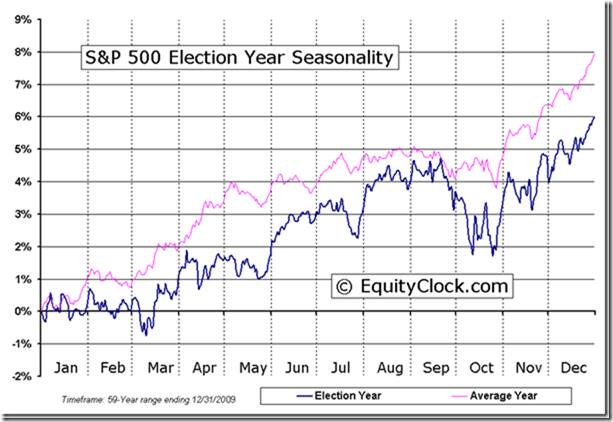
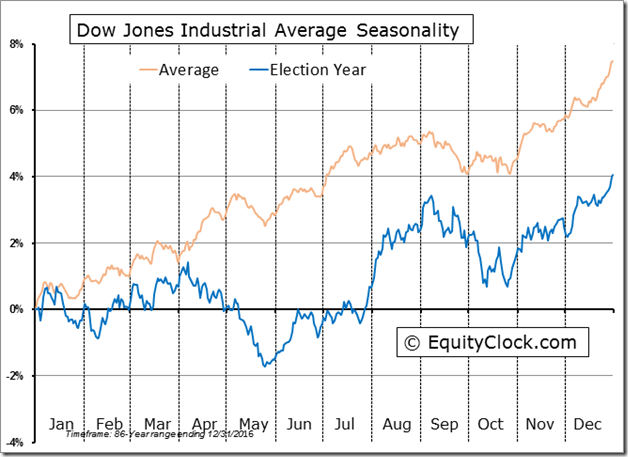
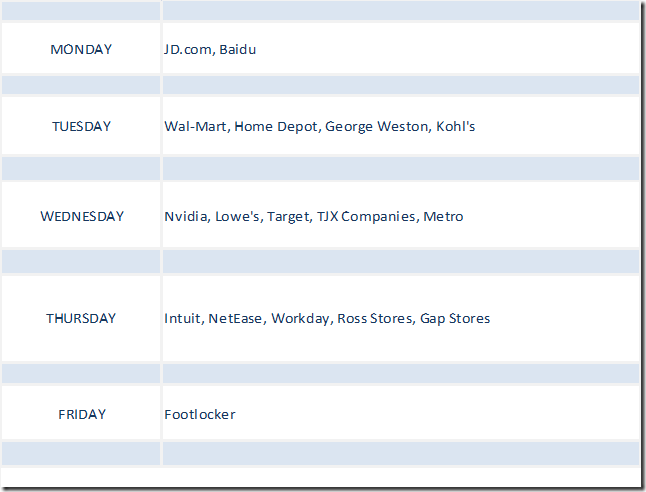
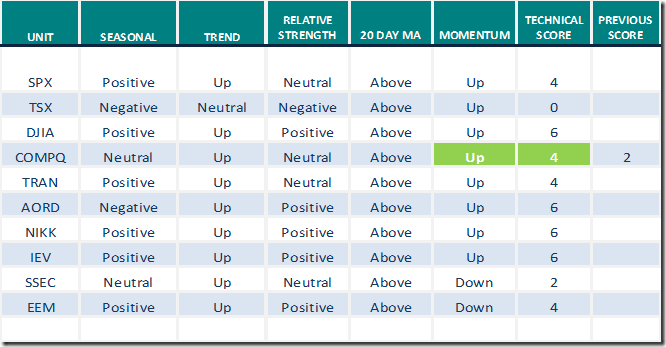
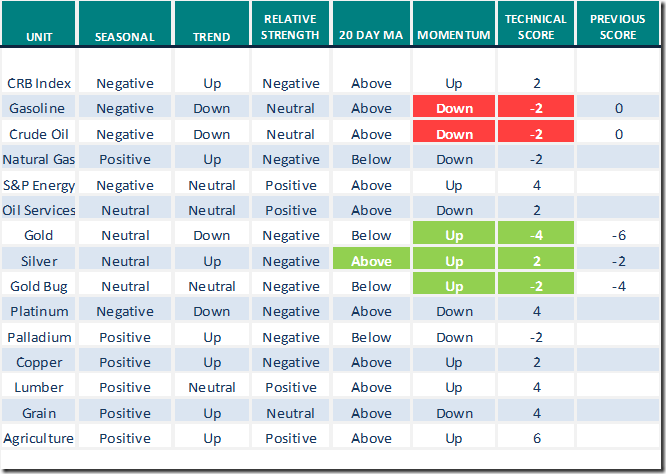
![clip_image002[5] clip_image002[5]](https://advisoranalyst.com/wp-content/uploads/2020/11/clip_image0025_thumb-7.png)
